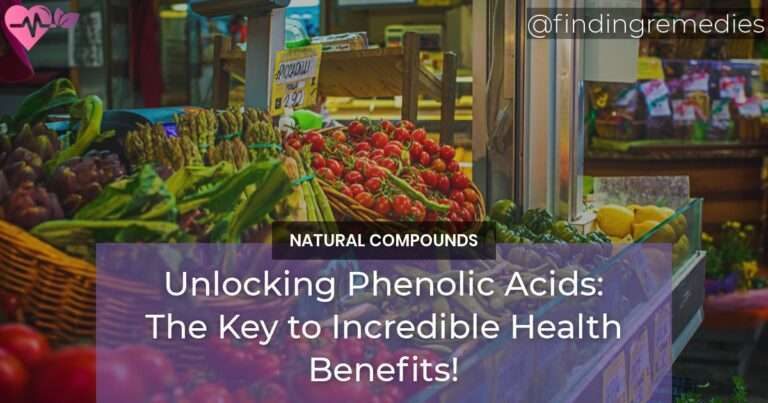Phenolic acids are a group of natural compounds found in various plant-based foods. They belong to the larger group of polyphenols, which are known for their potent antioxidant properties. Phenolic acids have gained attention in recent years due to their potential health benefits, including anti-inflammatory, cardiovascular, and neuroprotective effects.
In this article, we’ll explore the different health benefits of Phenolic Acids, the types of phenolic acids, their sources, and what they offer.
Table of Contents
Phenolic Acids: What are they?
Phenolic acids are organic compounds that are widely distributed in the plant kingdom. They are characterized by a hydroxyl group attached to an aromatic ring. There are two main types of phenolic acids: hydroxybenzoic acids and hydroxycinnamic acids.
Types of Phenolic Acids
Hydroxybenzoic Acids
Hydroxybenzoic acids are a type of phenolic acid with a benzoic acid structure. They are commonly found in fruits such as berries, plums, and cherries. The three main types of hydroxybenzoic acids are:
- Gallic Acid
- Vanillic Acid
- Ellagic Acid
Hydroxycinnamic Acids
Hydroxycinnamic acids are a type of phenolic acid with a cinnamic acid structure. They are found in a variety of foods, including fruits, vegetables, and grains. The three main types of hydroxycinnamic acids are:
- Caffeic Acid
- Ferulic Acid
- Cinnamic Acid
Sources of Phenolic Acids
Phenolic acids can be found in a wide range of plant-based foods, including:
Fruits
Many fruits are rich in phenolic acids, including:
- Berries (e.g. strawberries, raspberries, blueberries)
- Apples
- Cherries
- Plums
- Oranges
- Grapes
Vegetables
Phenolic acids are also abundant in many vegetables, including:
- Artichokes
- Broccoli
- Cabbage
- Carrots
- Eggplant
- Spinach
Legumes
Legumes are a good source of phenolic acids, including:
- Beans (e.g. black beans, kidney beans)
- Peas
- Lentils
Whole Grains
Whole grains are a rich source of phenolic acids, including:
- Oats
- Barley
- Brown Rice
- Wheat
Nuts and Seeds
Nuts and seeds contain phenolic acids, including:
- Almonds
- Walnuts
- Sesame Seeds
- Flax Seeds
Herbs and Spices
Many herbs and spices contain phenolic acids, including:
- Thyme
- Oregano
- Basil
- Cinnamon
- Cloves
Health Benefits of Phenolic Acids
Antioxidant Properties
Phenolic acids are potent antioxidants, which means they can help protect the body from free radical damage. Free radicals are unstable molecules that can cause cellular damage and contribute to the development of chronic diseases such as cancer, diabetes, and heart disease.
Anti-inflammatory Properties
Phenolic acids have anti-inflammatory properties, which means they can help reduce inflammation in the body. Chronic inflammation is linked to many health problems, including cancer, heart disease, and arthritis.
Neuroprotective Properties
Phenolic acids have been shown to have neuroprotective effects, which means they can help protect the brain from damage and improve cognitive function. They may also help reduce the risk of neurodegenerative diseases such as Alzheimer’s and Parkinson’s.
Cardiovascular Benefits
Phenolic acids may help improve cardiovascular health by reducing blood pressure, improving lipid profile, and reducing the risk of heart disease. They may also help improve blood flow and reduce the risk of blood clots.
Antimicrobial Properties
Phenolic acids have antimicrobial properties, which means they can help fight against harmful bacteria, viruses, and fungi. They may also help boost the immune system and improve overall health.
Anti-diabetic Properties
Phenolic acids may help improve blood sugar control and reduce the risk of diabetes. They may also help improve insulin sensitivity and reduce inflammation, which are both important factors in diabetes prevention.
Safety and Risk Factors
Adverse Effects
Phenolic acids are generally safe when consumed in food amounts. However, high doses of phenolic acids supplements may cause side effects such as digestive issues, headaches, and allergic reactions.
Interactions with Medications
Some phenolic acids may interact with certain medications, such as blood thinners or chemotherapy drugs. Consult with a healthcare provider before taking phenolic acid supplements if you are taking any medications.
Toxicity
Phenolic acids are generally non-toxic when consumed in food amounts. However, high doses of phenolic acid supplements may cause toxicity symptoms.
Conclusion
Phenolic acids are a group of natural compounds found in a variety of plant-based foods. They offer a wide range of health-promoting properties, including antioxidant, anti-inflammatory, neuroprotective, and cardiovascular benefits. They are also antimicrobial and may help reduce the risk of diabetes. Phenolic acids are generally safe when consumed in food amounts, but high doses of supplements may cause adverse effects. Incorporating phenolic acid-rich foods into your diet can be an excellent way to improve overall health and wellness.

